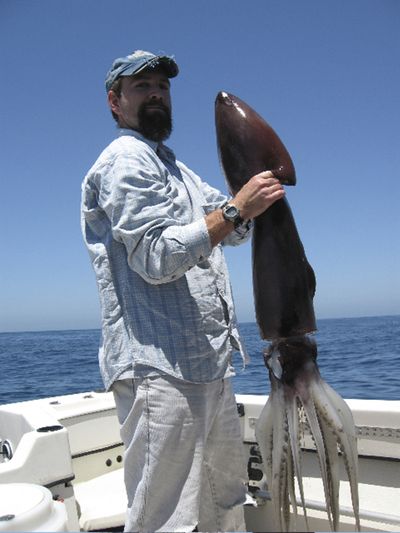Giant squid invade San Diego shores
Experts believe 5-foot-long, 100-pound cephalopods are following food source

SAN DIEGO – Jumbo flying squid – aggressive 5-foot-long sea monsters with razor-sharp beaks and toothy tentacles – have invaded the shallow waters off San Diego, spooking scuba divers and washing up dead on tourist-packed beaches.
The carnivorous calamari, which can grow up to 100 pounds, came up from the depths last week and swarms of them roughed up unsuspecting divers. Some divers report tentacles enveloping their masks and yanking at their cameras and gear.
Stories of too-close encounters with the alien-like cephalopods have chased many veteran divers out of the water and created a whirlwind of excitement among the rest, who are torn between their personal safety and the once-in-a-lifetime chance to swim with the deep-sea giants.
The so-called Humboldt squid are native to the deep waters off Mexico, where they have been known to attack humans and are nicknamed “red devils” for their rust-red coloring and mean streak. Those who dive with them there chum the water with bait and sometimes get in a metal cage or wear chain mail to avoid being lashed by tentacles.
The squid hunt in schools of up to 1,200, can swim up to 15 mph and can skim over the water to escape predators.
“I wouldn’t go into the water with them for the same reason I wouldn’t walk into a pride of lions on the Serengeti,” said Mike Bear, a local diver. “For all I know, I’m missing the experience of a lifetime.”
The squid are too deep to bother swimmers and surfers, but many longtime divers say they are staying out of the surf until the sea creatures clear out. Yet other divers, including Shanda Magill, couldn’t resist the chance to see the squid up close.
On a recent night, Magill watched in awe as a dozen squid with doleful, expressive eyes circled her group, tapping and patting the divers and gently bumping them before dashing away.
One especially large squid suspended itself motionless in the water about three feet away and peered at her closely, its eyes rolling, before it vanished into the black. A shimmering incandescence rippled along its body, almost as if it were communicating through its skin.
But the next night, things were different: A large squid surprised Magill by hitting her from behind and grabbing at her with its arms, pulling her sideways in the water. The powerful creature ripped her buoyancy hose away from her chest and knocked away her light.
When Magill recovered, she didn’t know which direction was up and at first couldn’t find the hose to help her stay afloat as she surfaced. The squid was gone.
“I just kicked like crazy. The first thing you think of is, ‘Oh my gosh, I don’t know if I’m going to survive this.’ If that squid wanted to hurt me, it would have,” she said.
Other divers have reported squid pulling at their masks and gear and roughing them up.
Scientists aren’t sure why the squid, which generally live in deep, tropical waters off Mexico and Central America, are showing up off the Southern California coast – but they are concerned.
In recent years, small numbers have been spotted from California to Sitka, Alaska, and are increasingly being spotted off the San Diego coastline – an alarming trend that scientists believe could be caused by anything from global warming to a shortage of food or a decline in the squid’s natural predators.
In 2005, a similar invasion off San Diego delighted fishermen and, in 2002, thousands of jumbo flying squid washed up on the beaches here. That year, workers removed 12 tons of dead and dying squid.
Research suggests the squid may have established a year-round population off California at depths of 300 to 650 feet, said Nigella Hillgarth, executive director of the Birch Aquarium at Scripps Institution of Oceanography. Divers this summer have been encountering them at about 60 to 80 feet down, they said.
Their presence off the coast – and the subsequent die-offs – may occur when their prey moves to shallow waters and the squid follow, and then get trapped and confused in the surf, said Hillgarth, who saw a dying squid on the beach last weekend.
“It was an amazing privilege to touch a creature like that and see how amazingly beautiful it was,” she said. “They have these wonderful eyes. … They look all-seeing, all-knowing.”